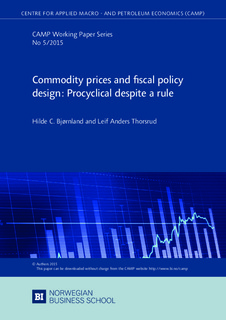Commodity prices and fiscal policy design: Procyclical despite a rule
Abstract
We analyse if the adoption of a fiscal spending rule insulates the domestic economy from commodity price fluctuations in a resource-rich economy. To do so we develop a time-varying Dynamic Factor Model, in which we allow both the volatility of structural shocks and the systematic fiscal policy responses to change over time. We focus on Norway, a country that is put forward as exemplary with its handling of resource wealth. Unlike most oil exporters, Norway has devised a fiscal frame- work with the view to shield the domestic economy from oil price fluctuations. By transferring its petroleum revenues to a sovereign wealth fund, and then consuming only the expected real return on the fund, fiscal policy allows for a gradual phasing in of the petroleum revenue, unrelated to movements in oil prices.
We find that, contrary to common perception, fiscal policy has been more (not less) procyclical with commodity prices since the adoption of the fiscal rule in 2001. Fiscal policy has thereby worked to exacerbate the commodity price fluctuations on the domestic economy. Large inflows of money to the fund during a period of rapidly increasing oil prices is part of the explanation. Still, Norway has managed to save a large share of its petroleum income for future generations. Compared to many other resource-rich economies practising a more spend-as-you-go strategy, this is a great success.
